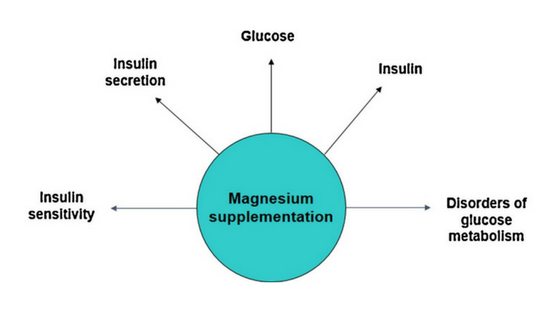
Magnesium has many functions within the human body and it plays an important role in the prevention and treatment of many diseases.
Sadly, studies show that 50-80% of people with Type 2 diabetes have magnesium deficiency. In this article we are going to explore how magnesium supplementation can help in improving blood glucose control and long-term health in people with Type 2 diabetes.
Magnesium and Health
Magnesium is the fourth most abundant mineral in the body. It has been recognized as a cofactor for more than 300 enzymatic reactions in the body and is crucial for the metabolic reactions leading to energy production within every cell of our body.
Low levels of magnesium have been associated with a higher risk of developing a number of chronic diseases, such as Alzheimer’s disease, insulin resistance and type-2 diabetes mellitus, high blood pressure, heart disease and stroke, migraine headaches, attention deficit hyperactivity disorder (ADHD) and even cancer.
Most people fail to get enough magnesium from their diets. Men need 400–420 mg/day and women 300–310 mg/day.
Dietary Sources of Magnesium

Magnesium-rich foods include whole grains, beans, nuts, avocados, bananas and green leafy vegetables such as spinach.
Unfortunately these foods are often lacking from the diets of people with type 2 diabetes. Processed and refined products are much more common in western diets. These foods are depleted of much needed vitamins and minerals such as magnesium. The typical grain refining process for bread and pasta removes 80-95% of total magnesium.
Magnesium deficiency often results from:
- An inadequate intake from the diet
- Overuse of antacid medications (proton-pump inhibitors such as nexium, prevacid and dexilent)
Magnesium and risk of Type 2 Diabetes
Magnesium plays a crucial role in glucose and insulin metabolism. Magnesium deficiency leads to insulin resistance, the metabolic syndrome and increases the risk of Type 2 diabetes.
A review study examining magnesium supplementation published in the Journal Pharmacological Research in September 2016, concluded that supplementation with magnesium for 4 months significantly improved insulin sensitivity, reduced fasting glucose and improved disorders of glucose metabolism (see the graphic below).

Studies also show that:
- A higher magnesium intake may be particularly beneficial in middle-aged persons, especially those with a high risk of developing diabetes
- A higher magnesium intake significantly lowers the risk of progressing from pre-diabetes to diabetes
- Magnesium supplementation in pre-diabetic people significantly decreases triglyceride levels and increases HDL cholesterol levels in addition to improving glucose control
- Magnesium supplementation improves insulin sensitivity in people who have excess weight even if they have normal magnesium levels. This which means that optimizing magnesium levels early can prevent insulin resistance and risk of Type 2 diabetes later in life
- Having adequate magnesium levels is key for preventing diabetic complications such as heart disease and stroke, depression and dementia.
- Magnesium intake also affects inflammation in the body. People with the lowest magnesium intake had the higher levels of inflammatory markers such as CRP, IL-6 and fibrinogen.
My Key Message to You
- Add magnesium-rich foods in your diet such as beans, legumes, nuts, whole-grains (in sensible amounts) and green leafy vegetables.
- Test your blood glucose levels often. If you have excess weight (especially around the belly) I also suggest you check your insulin levels often too.
- Magnesium supplementation is definitely needed if you are in risk of developing insulin resistance or if you have been diagnosed as pre-diabetic.
- Magnesium improves insulin sensitivity and helps in the prevention and good management of Type 2 Diabetes.
References
- Sales, Cristiane Hermes, Lucia Fátima Campos Pedrosa, Josivan Gomes Lima, Telma Maria Araújo Moura Lemos, and Célia Colli. “Influence of magnesium status and magnesium intake on the blood glucose control in patients with type 2 diabetes.” Clinical Nutrition 30, no. 3 (2011): 359-364.
- Simental-Mendía, Luis E., Amirhossein Sahebkar, Martha Rodríguez-Morán, and Fernando Guerrero-Romero. “A systematic review and meta-analysis of randomized controlled trials on the effects of magnesium supplementation on insulin sensitivity and glucose control.” Pharmacological research 111 (2016): 272-282.
- Hruby, Adela, James B. Meigs, Christopher J. O’Donnell, Paul F. Jacques, and Nicola M. McKeown. “Higher magnesium intake reduces risk of impaired glucose and insulin metabolism and progression from prediabetes to diabetes in middle-aged americans.” Diabetes Care 37, no. 2 (2014): 419-427.




